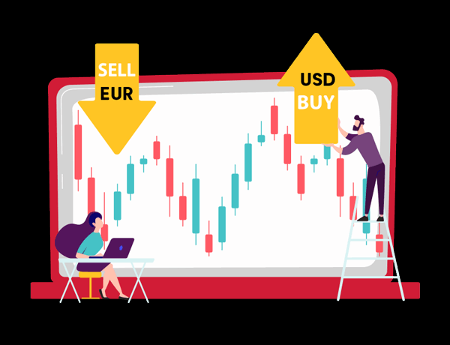Forex is the world’s largest market by trading volume and liquidity. Brokers, businesses, governments, and other economic agents trade currencies and forex derivatives to enable international commerce.
Traders also use the market for speculative reasons. There are various arbitrage opportunities to be found with exchange rates and interest rates, making the market a popular one to trade in large volume or on leverage.
The forex market consists of fiat currency pairs and their relative market prices. These pairs are typically bought and sold by the lot. A standard lot contains 100,000 units of the pair’s base currency, but other smaller sizes are available, ranging down to 100 units.
What Is the Forex Market?
The foreign exchange market is where currencies are traded. Currencies are important because they enable purchase of goods and services locally and across borders. International currencies need to be exchanged in order to conduct foreign trade and business.
One unique aspect of this international market is that there is no central marketplace for foreign exchange. Rather, currency trading is conducted electronically over-the-counter (OTC), which means that all transactions occur via computer networks between traders around the world, rather than on one centralized exchange.
The market is open 24 hours a day, five and a half days a week, and currencies are traded worldwide in the major financial centers of London, New York, Tokyo, Zurich, Frankfurt, Hong Kong, Singapore, Paris and Sydney—across almost every time zone. This means that when the trading day in the U.S. ends, the forex market begins anew in Tokyo and Hong Kong. As such, the forex market can be extremely active any time of the day, with price quotes changing constantly.
While a lot of foreign exchange is done for practical purposes, the vast majority of currency conversion is undertaken with the aim of earning a profit. The amount of currency converted every day can make price movements of some currencies extremely volatile. It is this volatility that can make forex so attractive to traders: bringing about a greater chance of high profits, while also increasing the risk.
Speculators make up the other side of FX trading. Short-term, high-volume trading that takes advantage of very small fluctuations in currency prices is common. Forex is a market full of arbitrage opportunities for speculators, in part explaining the vast trading volume in the market.
Traders also look to make money with long-term opportunities such as fluctuating interest rates. Economic events and geopolitics also cause serious fluctuations over time in the currency markets. By purchasing a currency now and holding, there’s profit to be made long-term. You can also agree on exchange rates years in advance with futures contracts in a bet for or against the market
How do currency markets work?
Unlike shares or commodities, forex trading does not take place on exchanges but directly between two parties, in an over-the-counter (OTC) market. The forex market is run by a global network of banks, spread across four major forex trading centers in different time zones: London, New York, Sydney and Tokyo. Because there is no central location, you can trade forex 24 hours a day.
There are three different types of forex market:
• Spot forex market: the physical exchange of a currency pair, which takes place at the exact point the trade is settled – ‘on the spot’ – or within a short period of time
• Forward forex market: a contract is agreed to buy or sell a set amount of a currency at a specified price, to be settled at a set date in the future or within a range of future dates
• Future forex market: a contract is agreed to buy or sell a set amount of a given currency at a set price and date in the future. Unlike forwards, a futures contract is legally binding
Most traders speculating on forex prices will not plan to take delivery of the currency itself; instead they make exchange rate predictions to take advantage of price movements in the market.

Forex for hedging
With any floating currency, there is always the chance that the exchange rate will move. While speculators try to make profits from volatility, others value stability. For example, a company planning to expand internationally may want to lock in an exchange rate to better plan its expenses. They can do this quite easily with a process called hedging.
Even speculators might want to lock in a specific exchange rate to protect against an economic shock or financial crisis. You can start hedging your FX rates with various financial instruments. The most common methods are using futures or options contracts. With a futures contract, an investor or trader is obliged to trade at a specific rate and amount at a future date.
Forex for speculation
Factors like interest rates, trade flows, tourism, economic strength, and geopolitical risk affect supply and demand for currencies, which creates daily volatility in the forex markets. An opportunity exists to profit from changes that may increase or reduce one currency’s value compared to another. A forecast that one currency will weaken is essentially the same as assuming that the other currency in the pair will strengthen because currencies are traded as pairs.
Imagine a trader who expects interest rates to rise in the U.S. compared to Australia while the exchange rate between the two currencies (AUD/USD) is 0.71 (it takes $0.71 USD to buy $1.00 AUD). The trader believes higher interest rates in the U.S. will increase demand for USD, and therefore the AUD/USD exchange rate will fall because it will require fewer, stronger USD to buy an AUD.
Assume that the trader is correct and interest rates rise, which decreases the AUD/USD exchange rate to 0.50. This means that it requires $0.50 USD to buy $1.00 AUD. If the investor had shorted the AUD and went long the USD, they would have profited from the change in value.
Closing thoughts
For anyone interested in international economics, trade, and global affairs, the forex market provides a unique alternative to stocks and shares. Forex trading can seem less accessible than crypto or stocks for small investors. But with the rise of online brokers and increasing competition in bringing financial services to the public, forex isn’t so out of reach. Many forex traders rely on leverage to make decent profits. These strategies carry a high risk of liquidation, so make sure you understand the mechanisms very well before taking risks.
Nike just bought a virtual shoe company that makes NFTs and sneakers ‘for the metaverse’
Nike just bought a virtual shoe company that makes NFTs and sneakers ‘for the metaverse’
5 major players building up the Metaverse
5 major players building up the Metaverse
El Salvador plans to create a ‘Bitcoin City’
El Salvador plans to create a ‘Bitcoin City’





